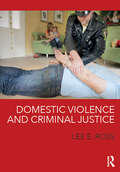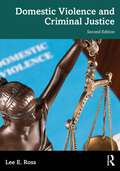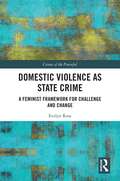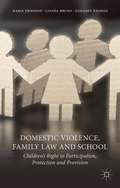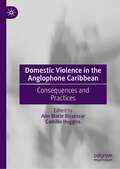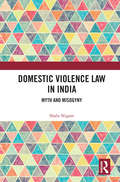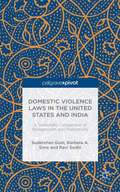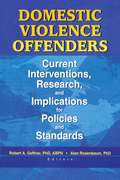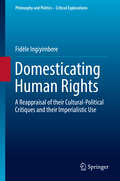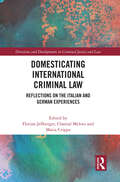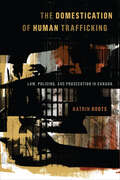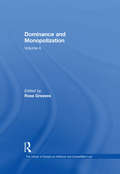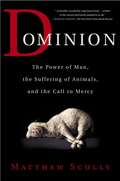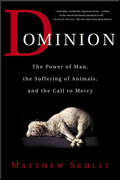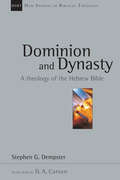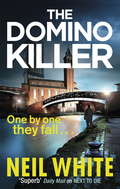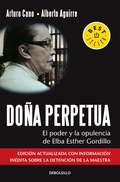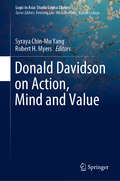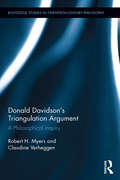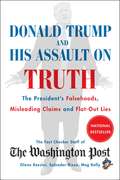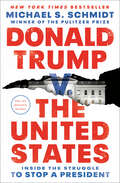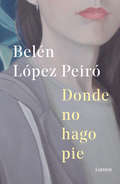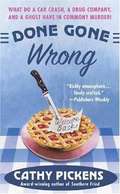- Table View
- List View
Domestic Violence and Criminal Justice
by Lee E. RossDomestic Violence and Criminal Justice offers readers an overview of domestic violence and its effects on society, including what can be done to curtail its rapid growth and widespread harm. Criminal justice and sociology students will find this text readable, up-to-date, and rich in historical detail. Geared toward the criminal justice system, this text focuses on civil and criminal justice processes, from securing a restraining order to completing an arrest, all the way to the final disposition.
Domestic Violence and Criminal Justice
by Lee E. RossDomestic Violence and Criminal Justice (Second Edition) offers readers an overview of domestic violence and its effects on society and includes helpful measures to curtail its rapid growth and widespread harm. Geared toward the criminal justice system, this newly revised and updated edition focuses on civil and criminal justice processes, from securing a restraining order to completing an arrest, to the final disposition.Fostering critical thinking in readers, the book covers the extent and nature of domestic violence and intimate partner violence (IPV) in its many forms and delves into the systemic responses to such violence during the COVID-19 era. Going beyond exploring the reactive efforts of policing and prosecution, this edition offers an expanded emphasis on the underpinnings and effectiveness of prevention and intervention, including data on the operations and challenges of domestic violence shelters, and a much-needed focus on victim services, victim advocacy, and social work involvement.This text is ideal for courses in criminal justice, criminology, social work, and sociology. Students will find this text readable, up-to-date, and rich in historical detail.
Domestic Violence and the Law (University Casebook Ser.)
by Elizabeth Schneider Cheryl Hanna Emily Sack Judith GreenbergThis book has been the product of many collaborations and wonderful connections over many years. The seed for this book was first planted in 1991, when Liz Schneider taught one of the country’s very first courses on Battered Women and the Law at Harvard Law School. The materials for this and subsequent courses were expanded little by little and ultimately formed the core of the book. Clare Dalton, then professor of law at Northeastern University School of Law School and later Director of Northeastern’s Domestic Violence Institute integrated domestic violence materials into an experimental first-year curriculum at Northeastern and drew on materials that Liz Schneider had prepared. The two of them then decided that this was a book whose time had come.
Domestic Violence as State Crime: A Feminist Framework for Challenge and Change (Crimes of the Powerful)
by Evelyn RoseDomestic Violence as State Crime presents a provocative challenge to the way that domestic violence is understood and addressed. Underpinned by a radical feminist perspective, the central argument of this book is that domestic violence against women constitutes a patriarchal state crime. By analysing the international, collective, structural, and institutional dimensions of this harm, the author outlines a spectrum of state complicity ranging from passive bystander to active producer, participant, and perpetrator. The wide-ranging analysis in this book draws on data from comparable liberal-democratic contexts including Australia, the United States, and the United Kingdom, in order to comprehensively show how domestic violence state criminality functions in practice – even in the present and in supposedly progressive contexts. This analysis provides valuable insight into why this epidemic-scale crime is ever resistant to a diversity of contemporary interventions. Drawing its concepts into a cohesive whole, the book then posits an overarching feminist typological theory of domestic violence as state crime. It also considers how domestic violence might be addressed if we confront its state crime dimensions and adopt a more holistic and transformative approach to remedy, redress, prevention, and justice. An accessible and compelling read, Domestic Violence as State Crime offers an innovative scholarly and activist contribution to the study of violence against women, feminism, criminology, and the broader critical study of law, politics, and society. It will appeal to anyone who is interested in thinking differently about domestic violence and the state.
Domestic Violence, Family Law and School: Children’s Right to Participation, Protection and Provision
by Maria Eriksson Linnéa Bruno Elisabet NäsmanDomestic Violence, Family Law and School discusses the ways in which domestic violence can impact on children's lives at pre-school and school. Disputes over parental responsibility, living arrangements or child contact can create difficulties not just for the child of disputing parents, but for all children at preschool or school, as well as for staff. This book uncovers new research on an under-explored area of children's lives and social work with vulnerable children and is shaped by a comparative lens that brings both similarities and differences between England, Wales and Sweden into focus. A theoretical framework for analyses of how welfare systems tackle domestic violence is elaborated and lessons for practice that can be drawn from the findings presented are highlighted.
Domestic Violence in the Anglophone Caribbean: Consequences and Practices
by Ann Marie Bissessar Camille HugginsDomestic violence continues to be a social problem that is rarely understood or discussed in many parts of the world. The same holds true in the Anglophone Caribbean. The Caribbean context is unique as it was birthed out of colonization, which was violent and brutal for those who were forced to migrate from another country as enslaved labor, as well as for those who were conquered out of their lands. Most Caribbean islands’ societies were created and developed by slaves, colonizers, and indentured servants. This history has left an indelible scar on all involved, which is exemplified by the antagonistic way people interact, whether it is between races, ethnicities, religions, or gender. Traditionally, domestic relationships and causal factors for domestic violence has been investigated from a myriad of perspectives including the ethnic lineage of the participants. However, in the Caribbean due to its historic origins, domestic violence should also be examined through the lens of its colonial past. This book examines the consequences of allowing domestic violence to perpetuate in the region. It then looks at some of practices used to provide support and find justice for victims and perpetrators in a Caribbean cultural context.
Domestic Violence Law in India: Myth and Misogyny
by Shalu NigamThis book examines the prevailing legal discourse surrounding domestic violence law in India. It investigates the myths, patriarchal stereotypes, and misconceptions that undermine the process of justice and dilute legal provisions to the detriment of survivors. The volume: Develops arguments based on legal case studies and draws extensively on knowledge from various fields of study, as well as the experience of women survivors. Examines fallacies within the legal framework through a study of strategic lawsuits against public participation suits within the Indian context. Proposes measures for a fair and more gender inclusive legal system that focuses on facilitating access to justice. Suggests that emphasis be laid on establishing the rule of law and eliminating the culture of violence. A key text on gender and law in India, this book will be indispensable to scholars and researchers of socio-legal studies, law, gender, human rights, women’s studies, social science, political science, and feminist jurisprudence in South Asia. It will also be of interest to NGOs, activists, and lawyers.
Domestic Violence Laws In The United States And India
by Sudershan Goel Barbara A. Sims Ravi SodhiDomestic Violence Laws in the United States and India is a comparative study of the domestic violence laws in India and the United States, seeking to illuminate the critical issues of intimate partner violence through the lenses of these two societies. Sims, Goel, and Sodhi believe society at large and systems of justice define and address domestic violence, and that both play significant roles in the form and prevalence of domestic violence . They juxtapose the ancient and traditional Indian laws with those of the United States as India seeks to take its place as a major, industrialized nation with progressive laws to protect the mostly female victims of domestic violence. Sims, Goel, and Sodhi explore the different ways domestic violence manifests itself, including dowry deaths in India, the "rule of thumb" law in the United States, and the multiple varieties of physical and mental violence in both societies.
Domestic Violence Offenders: Current Interventions, Research, and Implications for Policies and Standards
by Alan RosenbaumWomen’s shelters and safe houses were a good first step, but they only address part of the problem. Learn what else must be done to address the problem of domestic violence! Domestic Violence Offenders presents recent research, current interventions, and legal standards for people arrested for domestic violence. It also addresses the controversies that have arisen in the wake of the mandatory standards for batterer interventions that have been established by various jurisdictions, examining the type of treatment modality and content permitted by various jurisdictions, the duration of treatment, and the relationship of the various standards to actual research. This essential book also provides suggestions for a more inclusive, less rigid process for creating standards and policies for use with this population. Handy tables and charts make the information easily accessible. From the editors: “The initial societal response to intimate partner violence was the development of the shelter movement for battered women. Women&’s shelters and/or safe houses developed in almost all major population areas throughout the United States and abroad. The goals were to provide a safe environment for abused women and their children, to offer advocacy, counseling, and medical services, and to empower women to leave their abusers. While shelters continue to serve these and other critical needs and are an essential part of the service delivery system for battered women, they address only part of the problem. Left untreated, batterers often will continue to abuse their partners who leave shelters and return to the relationship. If their partners leave the relationship, the batterers may find new victims to abuse. The response to this harsh reality was the development of batterer intervention programs.” Domestic Violence Offenders provides you with informed discussions of: the implications of research and policies for those providing interventions why it is premature for states to establish certain rigid standards for batterer programs, and how some of the current standards may produce more harm than good the history of batterer intervention programs completion and recidivism among court- and self-referred batterers the Alternatives to Violence program and the experiences and perceptions of its founder common aspects of various intervention programs—confidentiality, group structure and length, partner contacts, leadership configuration, and program goals topics addressed by most programs—power and control, anger management, substance abuse, stress reduction, parenting, communication, and more the controversial and often misunderstood issue of female partner aggression and violence the Stages of Change approach to domestic violence treatment lethality assessment and safety planning for partners of batterers the advantages of conjoint therapy for certain types of cases the Illinois Protocol for batterer programs outcome research on programs for batterers and a great deal more!
Domesticating Human Rights
by Fidèle IngiyimbereThis book develops a philosophical conception of human rights that responds satisfactorily to the challenges raised by cultural and political critics of human rights, who contend that the contemporary human rights movement is promoting an imperialist ideology, and that the humanitarian intervention for protecting human rights is a neo-colonialism. These claims affect the normativity and effectiveness of human rights; that is why they have to be taken seriously. At the same time, the same philosophical account dismisses the imperialist crusaders who support the imperialistic use of human rights by the West to advance liberal culture. Thus, after elaborating and exposing these criticisms, the book confronts them to the human rights theories of John Rawls and Jürgen Habermas, in order to see whether they can be addressed. Unfortunately, they are not. Therefore, having shown that these two philosophical accounts of human rights do not respond convincingly to those the postcolonial challenges, the book provides an alternative conception that draws the understanding of human rights from local practices. It is a multilayer conception which is not centered on state, but rather integrates it in a larger web of actors involved in shaping the practice and meaning of human rights. Confronted to the challenges, this new conception offers a promising way for addressing them satisfactorily, and it even sheds new light to the classical questions of universality of human rights, as well as the tension between universalism and relativism.
Domesticating International Criminal Law: Reflections on the Italian and German Experiences
by Florian Jeßberger Chantal Meloni Maria CrippaThis book provides an essential and critical overview of the most significant issues concerning the domestication of international criminal law, in particular with regard to the implementation of the ICC Statute. It discusses the most recent proposals for reform of the German Völkerstrafgesetzbuch 20 years after its adoption, as well as it introduces the project for an Italian code of international crimes drafted by the Committee of experts established in 2022 by the Ministry of Justice. Following the adoption of the ICC Statute, many States, including Germany with the ‘Völkerstrafgesetzbuch’, introduced specific legislation to incorporate international criminal law into their domestic legal systems and have been investigating and prosecuting war crimes, crimes against humanity, genocide, and even aggression ever since. 25 years later, however, the process is not completed as other countries, like Italy, are still in the way to adopt provisions on international crimes. This book opens with a broad overview of the different approaches of the domestication of international criminal law, with a specific focus on the German and the Italian systems. After an assessment of the prerequisites for the domestic implementation of international criminal law, also from a constitutional law perspective, each chapter offers an in-depth analysis of a specific issue, such as: the definition of international crimes (genocide and crimes against humanity, war crimes and aggression); the applicability of and exceptions to the general principles of domestic criminal law; the regulation of individual criminal responsibility; the sanctioning process; as well as procedural aspects related to immunities, jurisdiction and prosecutorial discretion. The strong academic perspective of the authors is well complemented by an equally strong practitioner perspective, provided by legal scholars in the highest positions in International and national judicial institutions, resulting in a well-informed and critical appraisal of the most recent developments overall in the international criminal justice system. Domesticating International Criminal Law will be of great interest to legal scholars and students, as well as practitioners with an interest in comparative and international law, international criminal law and international relations.
The Domestication of Human Trafficking: Law, Policing, and Prosecution in Canada
by Katrin RootsHuman trafficking has emerged as one of the top international and domestic policy concerns, and is well covered and often sensationalized by the media. The nature of the topic combined with various international pressures has resulted in an array of government-led mandates to combat the issue. The Domestication of Human Trafficking examines Canada’s criminal justice approaches to human trafficking, with a particular focus on the ways in which the intersecting factors of race, class, gender, and sexuality impact practice. Using a wide range of qualitative and empirically grounded research methods, including extensive analysis of court documents, trial transcripts, and interviews with criminal justice actors, this book contributes to much-needed research that examines, specifies, and sometimes complicates the narratives of how trafficking works as a criminal offence. The Domestication of Human Trafficking turns our attention to the ways in which the offence of human trafficking is made on the front lines of criminal justice efforts in Canada.
Dominance and Monopolization: Volume II (The Library of Essays on Antitrust and Competition Law)
by Rosa GreavesAntitrust and competition law is a fast moving area of law and the subject of extensive academic research. The aim of this volume is to select articles as tools for understanding how antitrust and competition law is applied to unilateral conduct which is harmful to the consumer and to the competitiveness of the market. The articles examine the meaning of dominance and monopolisation and show that although legal and economic rules have been developed to establish whether undertakings hold such strong market positions, it is often difficult to determine with certainty that the undertaking being investigated meets the threshold. The various debates on pricing and non-pricing conduct are also represented as are the conflicts that have arisen regarding the exercise of intellectual property rights by powerful undertakings, particularly in the context of the new economies. The volume includes scholarly articles published on both sides of the Atlantic and enables a greater understanding of the application of antitrust and competition law from the point of view of economics and politics.
Dominion: The Power of Man, the Suffering of Animals, and the Call to Mercy
by Matthew ScullyAs an eye opening, painful and infuriating, insightful and rewarding book, Dominion is a plea for human benevolence and mercy, a scathing attack on those who would dismiss animal activists as mere sentimentalists, and a demand for reform from the government down to the individual.
Dominion: The Power of Man, the Suffering of Animals, and the Call to Mercy
by Matthew Scully"And God said, Let us make man in our image, after our likeness; and let them have dominion over the fish of the sea, and over the fowl of the air, and over the cattle, and over all the earth, and over every creeping thing that creepeth upon the earth." --Genesis 1:24-26In this crucial passage from the Old Testament, God grants mankind power over animals. But with this privilege comes the grave responsibility to respect life, to treat animals with simple dignity and compassion.Somewhere along the way, something has gone wrong.In Dominion, we witness the annual convention of Safari Club International, an organization whose wealthier members will pay up to $20,000 to hunt an elephant, a lion or another animal, either abroad or in American "safari ranches," where the animals are fenced in pens. We attend the annual International Whaling Commission conference, where the skewed politics of the whaling industry come to light, and the focus is on developing more lethal, but not more merciful, methods of harvesting "living marine resources." And we visit a gargantuan American "factory farm," where animals are treated as mere product and raised in conditions of mass confinement, bred for passivity and bulk, inseminated and fed with machines, kept in tightly confined stalls for the entirety of their lives, and slaughtered in a way that maximizes profits and minimizes decency.Throughout Dominion, Scully counters the hypocritical arguments that attempt to excuse animal abuse: from those who argue that the Bible's message permits mankind to use animals as it pleases, to the hunter's argument that through hunting animal populations are controlled, to the popular and "scientifically proven" notions that animals cannot feel pain, experience no emotions, and are not conscious of their own lives.The result is eye opening, painful and infuriating, insightful and rewarding. Dominion is a plea for human benevolence and mercy, a scathing attack on those who would dismiss animal activists as mere sentimentalists, and a demand for reform from the government down to the individual. Matthew Scully has created a groundbreaking work, a book of lasting power and importance for all of us.
Dominion and Dynasty: A Theology of the Hebrew Bible (New Studies in Biblical Theology #Volume 15)
by Stephen G. DempsterChristian theologians rarely study the Old Testament in its final Hebrew canonical form, even though this was very likely the Bible used by Jesus and the early church. However, once read as a whole, the larger structure of the Hebrew Bible (Tanakh) provides a "wide-angle lens" through which its contents can be viewed. In this stimulating New Studies in Biblical Theology volume, Stephen G. Dempster argues that, despite its undoubted literary diversity, the Hebrew Bible possesses a remarkable structural and conceptual unity. The various genres and books are placed within a comprehensive narrative framework which provides an overarching literary and historical context. The many texts contribute to this larger text, and find their meaning and significance within its story of "dominion and dynasty," which ranges from Adam to the Son of Man, from David to the coming Davidic king. Addressing key issues in biblical theology, the works comprising New Studies in Biblical Theology are creative attempts to help Christians better understand their Bibles. The NSBT series is edited by D. A. Carson, aiming to simultaneously instruct and to edify, to interact with current scholarship and to point the way ahead.
The Domino Killer
by Neil WhiteWhen a man is found beaten to death in a local Manchester park, Detective Constable Sam Parker is one of the investigating officers. Sam swiftly identifies the victim, but what at first looks like an open and shut case quickly starts to unravel when he realises that the victim's fingerprints were found on a knife at another crime scene, a month earlier.Meanwhile, Sam's brother, Joe - a criminal defence lawyer in the city - comes face to face with a man whose very presence sends shockwaves through his life. Joe must confront the demons of his past as he struggles to come to terms with the darkness that this man represents.Before long, Joe and Sam are in way over their heads, both sucked into a terrifying game of cat-and-mouse that threatens to change their lives for ever...'Authenticity reeks from every page...hypnotic, troubling crime writing with a superb villain and a distinctive atmosphere.' Daily Mail on Next to Die
The Domino Killer
by Neil WhiteWhen a man is found beaten to death in a local Manchester park, Detective Constable Sam Parker is one of the investigating officers. Sam swiftly identifies the victim, but what at first looks like an open and shut case quickly starts to unravel when he realises that the victim's fingerprints were found on a knife at another crime scene, a month earlier.Meanwhile, Sam's brother, Joe - a criminal defence lawyer in the city - comes face to face with a man whose very presence sends shockwaves through his life. Joe must confront the demons of his past as he struggles to come to terms with the darkness that this man represents.Before long, Joe and Sam are in way over their heads, both sucked into a terrifying game of cat-and-mouse that threatens to change their lives for ever...'Authenticity reeks from every page...hypnotic, troubling crime writing with a superb villain and a distinctive atmosphere.' Daily Mail on Next to Die
Doña Perpetua: El poder y la opulencia de Elba Esther Gordillo
by Arturo Cano Alberto AguirreNuevas revelaciones sobre el polémico caso de Elba Esther Gordillo. Las llamadas de dos secretarios de Estado, que la invitaban a compartir el pan y la sal, hicieron que Elba Esther Gordillo cambiara su itinerario. En lugar de volar a Guadalajara, donde la esperaba la cúpula de su "república romana", su avión aterrizó en Toluca. Ahí fue detenida. Los cargos: lavado de dinero y delincuencia organizada. Las autoridades dieron a conocer la lista de sus mansiones, de las exclusivas tiendas donde se vestía con cargo a las cuotas de los maestros y de sus millonarias transferencias bancarias. Muchos de esos datos aparecían ya en este libro, publicado originalmente en 2008, y que hoy se presenta en una edición actualizada. Desde su aparición, Doña Perpetua se convirtió en un texto de referencia, pues se trata de la biografía más completa de un personaje que influyó en la política nacional a lo largo de poco más de cuatro sexenios. Empeñado en la restauración del viejo presidencialismo, el gobierno de Enrique Peña Nieto -beneficiario de la maquinaria electoral del magisterio- lanzó una advertencia a otros actores por medio de la detención de Elba Esther Gordillo, la cabeza más impresentable de los "poderes fácticos". La llegada de la Maestra al poder se dio gracias a
Donald Davidson on Action, Mind and Value (Logic in Asia: Studia Logica Library)
by Syraya Chin-Mu Yang Robert H. MyersThis book brings together a wide range of innovative reflections on the pivotal role that Davidson’s concept of agency plays in his later philosophy and its impact on his epistemology, his philosophy of language and mind, and his philosophy of values. The authors critically assess central elements of Davidson’s program and offer reappraisals of his seminal contributions to, and his continuing influence on, the development of contemporary philosophy. By focusing on agency, the book reveals Davidson’s views to have been more dynamic and less reductive than previously acknowledged – pointing toward important new possibilities not only in the theory of knowledge, but also in the philosophy of mind.It is a valuable resource both for experts on Davidson’s philosophy and for those interested in central topics in the theory of action, the philosophy of mind and language, epistemology, moral philosophy, and the philosophy of values. It is also of interest to researchers in adjoining disciplines, such as cognitive science, linguistics, and psychology.
Donald Davidson's Triangulation Argument: A Philosophical Inquiry (Routledge Studies in Twentieth-Century Philosophy)
by Robert H. Myers Claudine VerheggenAccording to many commentators, Davidson’s earlier work on philosophy of action and truth-theoretic semantics is the basis for his reputation, and his later forays into broader metaphysical and epistemological issues, and eventually into what became known as the triangulation argument, are much less successful. This book by two of his former students aims to change that perception. In Part One, Verheggen begins by providing an explanation and defense of the triangulation argument, then explores its implications for questions concerning semantic normativity and reductionism, the social character of language and thought, and skepticism about the external world. In Part Two, Myers considers what the argument can tell us about reasons for action, and whether it can overcome skeptical worries based on claims about the nature of motivation, the sources of normativity and the demands of morality. The book reveals Davidson’s later writings to be full of innovative and important ideas that deserve much more attention than they are currently receiving.
Donald Trump and His Assault on Truth: The President's Falsehoods, Misleading Claims and Flat-Out Lies
by The Washington Post Fact Checker StaffA NATIONAL BESTSELLER In perilous times, facts, expertise, and truth are indispensable. President Trump&’s flagrant disregard for the truth and his self-aggrandizing exaggerations, specious misstatements, and bald-faced lies have been rigorously documented and debunked since the first day of his presidency by The Washington Post&’s Fact Checker staff.Donald Trump and His Assault on Truth is based on the only comprehensive compilation and analysis of the more than 16,000 fallacious statements that Trump has uttered since the day of his inauguration. He has repeated many of his most outrageous claims dozens or even hundreds of times as he has sought to bend reality to his political fantasy and personal whim. Drawing on Trump&’s tweets, press conferences, political rallies, and TV appearances, The Washington Post identifies his most frequently used misstatements, biggest whoppers, and most dangerous deceptions. This book unpacks his errant statements about the economy, immigration, the impeachment hearings, foreign policy, and, of critical concern now, the coronavirus crisis as it unfolded. Fascinating, startling, and even grimly funny, Donald Trump and His Assault on Truth by The Washington Post is the essential, authoritative record of Trump&’s shocking disregard for facts.
Donald Trump v. The United States: Inside the Struggle to Stop a President
by Michael S. SchmidtWith unparalleled reporting, a Pulitzer Prize–winning New York Times reporter continues to break news about the most important political story of our lives as he chronicles the clash between a president and the officials of his own government who tried to stop him. <p><p> In the early days of the Trump presidency, the people who work in the institutions that make America America saw Trump up close in the Oval Office and became convinced that they had to stand up to an unbound president. These officials faced a situation without parallel in American history: What do you do, and who do you call, if you are the only one standing between the president, his extraordinary powers, and the abyss? <p> Michael S. Schmidt’s Donald Trump v. The United States tells the dramatic, high-stakes story of those who felt compelled to confront and try to contain the most powerful man in the world as he shredded norms and sought to expand his power. <p> Schmidt has broken many of the major stories of the Trump era, from the news of Hillary Clinton’s use of a personal email account to the report on former FBI director James Comey’s contemporaneous memos of conversations with Trump that led directly to the appointment of special counsel Robert S. Mueller III. Now he takes us inside the defining events of the presidency, chronicles them up close, and records the clash between an increasingly emboldened president and those around him, who find themselves trying to thwart the president they had pledged to serve, unsure whether he is acting in the interest of the country, his ego, his family business, or Russia. Through their eyes and ears, we observe an epic struggle. <p> Drawing on secret FBI and White House documents and confidential sources inside federal law enforcement and the West Wing, Donald Trump v. The United States is vital journalism, recording the shocking reality of a presidency like no other, a riveting contemporary history, and a lasting account of just how fragile and vulnerable the institutions of American democracy really are. <p> <b>A New York Times Bestseller</b>
Donde no hago pie
by Belén López PeiróCrónica del duro proceso que sigue a la denuncia de un abuso familiar y que implica enfrentar los prejuicios de la sociedad y los obstáculos de la justicia. «Contemporáneo en su estilo breve y fragmentario -donde se cruzan diario, imágenes, géneros y lenguajes diversos-, esta novela lírica y vertiginosa revoluciona la no ficción en sus formas y temas».Gabriela Cabezón Cámara Después de un año sin noticias, una llamada desde la Fiscalía anuncia que, finalmente, la denuncia por abuso sexual ha sido elevada a juicio. Esa mañana invernal comienza para la narradora otro duro proceso: encontrar representación legal, entender las lógicas burocráticas de la Justicia, tejer redes de apoyo para afrontar la causa contra su tío, un comisario poderoso, y juntar coraje para reabrir un expediente que lleva al pasado familiar. Sin demagogias, Belén López Peiró revisa los contornos difusos de los recuerdos; ensaya respuestas al agobio de audiencias humillantes e indaga en los laberintos de los juicios por jurado. Donde no hago pie profundiza el proyecto literario de Por qué volvías cada verano, antecedente clave de miles de denuncias anónimas y otras de enorme repercusión mediática. Con un ritmo avasallante, esta crónica encuentra las palabras para transformar en acción política un delito que pretendía permanecer secreto. Sobre Por qué volvías cada verano, la crítica dijo: «Uno de los 18 mejores libros del año».Revista Rolling Stone «De una contundencia expresiva increíble».Mauro Libertella, La Agenda «Una de las autoras del año».Carolina Amoroso, TN «Uno de los textos más valientes y más crudos que apareció recientemente».Agustina Larrea, Infobae
Done Gone Wrong (Avery Andrews #2)
by Cathy PickensThe delightful Avery Andrews of Malice Domestic winner Southern Fried comes out of hiding to face a big-city trial and finds unpleasant surprises. A chance to be a part of a headline-grabbing case against a drug company has lured attorney Avery Andrews back to Charleston, South Carolina. She agrees to meet with Mark Tilman, a young doctor from her home town who seems to have something on his mind. When he doesn't show, she figures he stood her up and takes comfort in the restaurant's she-crab soup. But it turns out he had a fatal car accident. Something about the crash isn't right, and Mark's father asks Avery to look into his death. Between that and digging up dirt on the wonder drug Uplift, Avery is coming up with more questions than answers. Of course, Avery isn't the only one making headlines. Back in Dacus, her mom is on live television confronting a teenager's dynamite-toting paramour in a hostage crisis at the Burger Hut, Great-Aunt Aletha is mixing it up with the now-toupee-less postman, and the son of a ghost wants vengeance. In short, it's life as usual back in Dacus, while in Charleston, Avery is forced to face demons from her own past. "[A] richly atmospheric second novel...finely crafted." Publishers Weekly. "Pickens, a lawyer and teacher with deep roots in the Carolinas balances the dark and light aspects of the subgenre adeptly, and almost always manages to avoid corn and sentimentality." Chicago Tribune.
